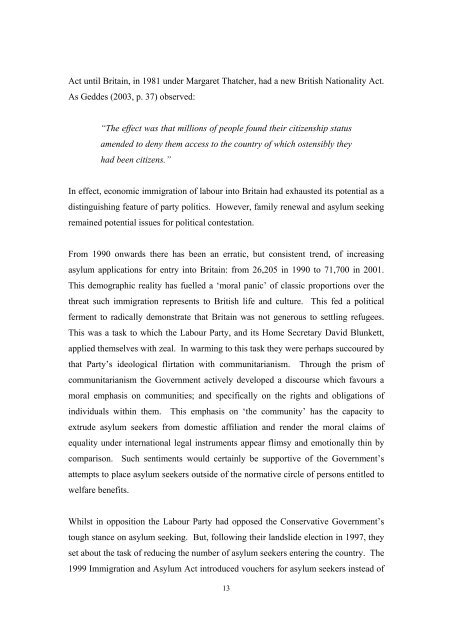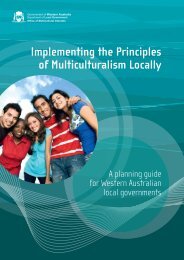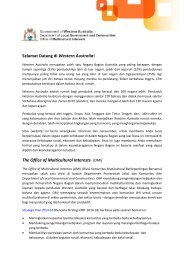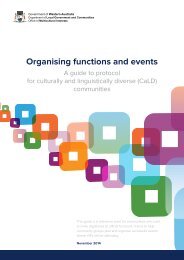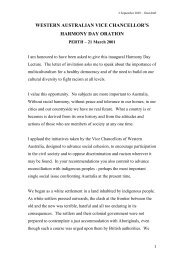Doing good by stealth, whilst flirting with racism - Office of ...
Doing good by stealth, whilst flirting with racism - Office of ...
Doing good by stealth, whilst flirting with racism - Office of ...
You also want an ePaper? Increase the reach of your titles
YUMPU automatically turns print PDFs into web optimized ePapers that Google loves.
Act until Britain, in 1981 under Margaret Thatcher, had a new British Nationality Act.<br />
As Geddes (2003, p. 37) observed:<br />
“The effect was that millions <strong>of</strong> people found their citizenship status<br />
amended to deny them access to the country <strong>of</strong> which ostensibly they<br />
had been citizens.”<br />
In effect, economic immigration <strong>of</strong> labour into Britain had exhausted its potential as a<br />
distinguishing feature <strong>of</strong> party politics. However, family renewal and asylum seeking<br />
remained potential issues for political contestation.<br />
From 1990 onwards there has been an erratic, but consistent trend, <strong>of</strong> increasing<br />
asylum applications for entry into Britain: from 26,205 in 1990 to 71,700 in 2001.<br />
This demographic reality has fuelled a ‘moral panic’ <strong>of</strong> classic proportions over the<br />
threat such immigration represents to British life and culture. This fed a political<br />
ferment to radically demonstrate that Britain was not generous to settling refugees.<br />
This was a task to which the Labour Party, and its Home Secretary David Blunkett,<br />
applied themselves <strong>with</strong> zeal. In warming to this task they were perhaps succoured <strong>by</strong><br />
that Party’s ideological flirtation <strong>with</strong> communitarianism. Through the prism <strong>of</strong><br />
communitarianism the Government actively developed a discourse which favours a<br />
moral emphasis on communities; and specifically on the rights and obligations <strong>of</strong><br />
individuals <strong>with</strong>in them. This emphasis on ‘the community’ has the capacity to<br />
extrude asylum seekers from domestic affiliation and render the moral claims <strong>of</strong><br />
equality under international legal instruments appear flimsy and emotionally thin <strong>by</strong><br />
comparison. Such sentiments would certainly be supportive <strong>of</strong> the Government’s<br />
attempts to place asylum seekers outside <strong>of</strong> the normative circle <strong>of</strong> persons entitled to<br />
welfare benefits.<br />
Whilst in opposition the Labour Party had opposed the Conservative Government’s<br />
tough stance on asylum seeking. But, following their landslide election in 1997, they<br />
set about the task <strong>of</strong> reducing the number <strong>of</strong> asylum seekers entering the country. The<br />
1999 Immigration and Asylum Act introduced vouchers for asylum seekers instead <strong>of</strong><br />
13


